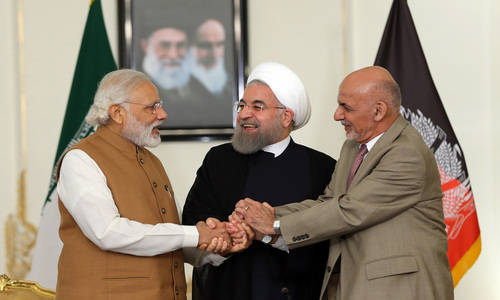WASHINGTON: Keen to jumpstart peace talks with the Taliban, the US Congress has avoided highlighting India’s role in Afghanistan in a bill that otherwise underlines Washington’s desire to build a strong military partnership with India.
The John S McCain National Defence Authorisation Act (NDAA) for the 2019 fiscal, which the US Senate passed by 87 to 10 votes on Thursday seeks to provide a legislative cover to Washington’s desire to build a strong relationship with India, which could counter China’s growing influence in Asia.
An earlier version of the bill highlighted the US desire of “furthering cooperative efforts” with India to “promote security and stability in Afghanistan.”
But the join conference report — adopted by the House and the Senate and sent to the White House for signature – does not underline this point.
There is a feeling in Washington that too much emphasis on India’s role in Afghanistan could annoy Pakistan and the Taliban, which could harm US efforts to start peace talks with the Taliban.
Late last month, senior US diplomats met Taliban representatives in Doha, Qatar, fulfilling a major demand of the militant group to hold direct talks with Washington.
Diplomatic sources in Washington say that India had advised Washington not to hold direct talks with the Taliban, and instead include the representatives of the US-backed government in Kabul as well.
But a former senior US diplomat, Ambassador Ryan Crocker, who has served in South Asia, told the NPR radio on Friday that representatives of the Afghan government did not attend the Doha talks because the Taliban wanted direct talks with the US.
The joint congressional bill, however, urged the Trump administration to “strengthen and enhance its major defence partnership with India, emphasising that such a partnership should enable “strategic, operational and tactical coordination between our militaries, and be jointly developed between the countries”.
It also said the US should work towards mutual security objectives by expanding engagement in multilateral frameworks, including the Quadrilateral Dialogue between the US, India, Japan, and Australia, to promote regional security and defend shared values and common interests in the rules-based order.
The bill asked the Trump administration to explore additional steps to implement the “Major Defence Partner” designation to better facilitate military interoperability, information sharing and appropriate technology transfers; and pursue strategic initiatives to help develop India’s defence capabilities.
The Senate version also asked the administration to designate a responsible individual within the Department of Defence to facilitate the major defence partnership with India.
It advised Washington to pursue strategic initiatives to help develop India’s defence capabilities and conducting additional joint exercises with India in the Persian Gulf, the Indian Ocean region, and the Western Pacific.
Published in Dawn, August 4th, 2018













































